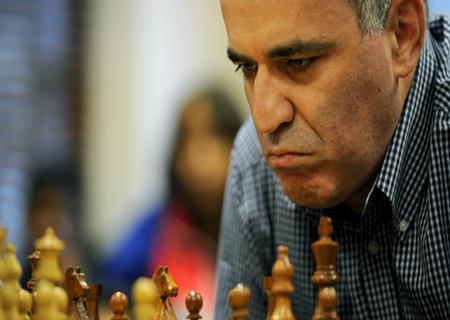
19 Jun Gary Kasparov

Speaker: Gary Kasparov
Chess Champion
Topics:
- A conversation with Garry Kasparov
- Innovation
Garry Kasparov was born on April 13, 1963 in Baku, the capital of Azerbaijan, then part of the USSR. Kasparov started playing chess at five and by the age of seven, he was a child chess prodigy. At nine, he had already won a semifinal of a ‘blitz’ championship for adults in Baku. He became the youngest player in history to win the Soviet Junior Championship (under 18), first when he was 12 years of age in Jan 1976 and then again aged 13 in 1977.
In 1979 he celebrated his 16th birthday and for the first time, entered a foreign adult tournament. Garry finished first ahead of fourteen Grandmasters.
Garry Kasparov achieved Grandmaster status at age 17 (1980).
In August 1980 aged 17, he won the World Junior Championship.
In 1984 aged 21, Garry Kasparov was the youngest player in chess history to compete in a World Championship final match.
At 22, on November 9, 1985 Garry became the youngest ever World Chess Champion when he beat Anatoli Karpov. This made him the 13th World Champion and he had already become the number one ranked player in the world.
In January of 1990, Kasparov created two milestones in chess history. First, he moved past Bobby Fischer’s best ever point rating of 2785 and then in November 1989 in Belgrade, he broke the magical 2800 ELO ratings point sound barrier. He was the first player in Chess history to do so. It was the chess equivalent of breaking the four-minute mile.
In Nov 1999, after winning the three major events of that year, he created a new milestone by achieving an ELO rating of 2851, the only player in the history of chess to pass the 2850 level.
From December 1981 to February 1991, Kasparov made chess history by not losing a single official event for ten years. This was the period in which he created the reputation of invincibility.
Those close to Garry know his unrestrained contagious laugh, his kindness and caring and know him as a multi-faceted human being. All of his adult life the courage of his convictions has been put to the test. His matches against Anatoly Karpov (the previous champion closely connected with the Communist establishment) were widely regarded as a show of individual opposition to the authoritarian state. He had difficulties with the USSR Sports Committee, the Communist Party and even the KGB. He was in the forefront of the anti-Communist movement, resulting in real threats to his person.
A conversation with Garry Kasparov
Innovation



